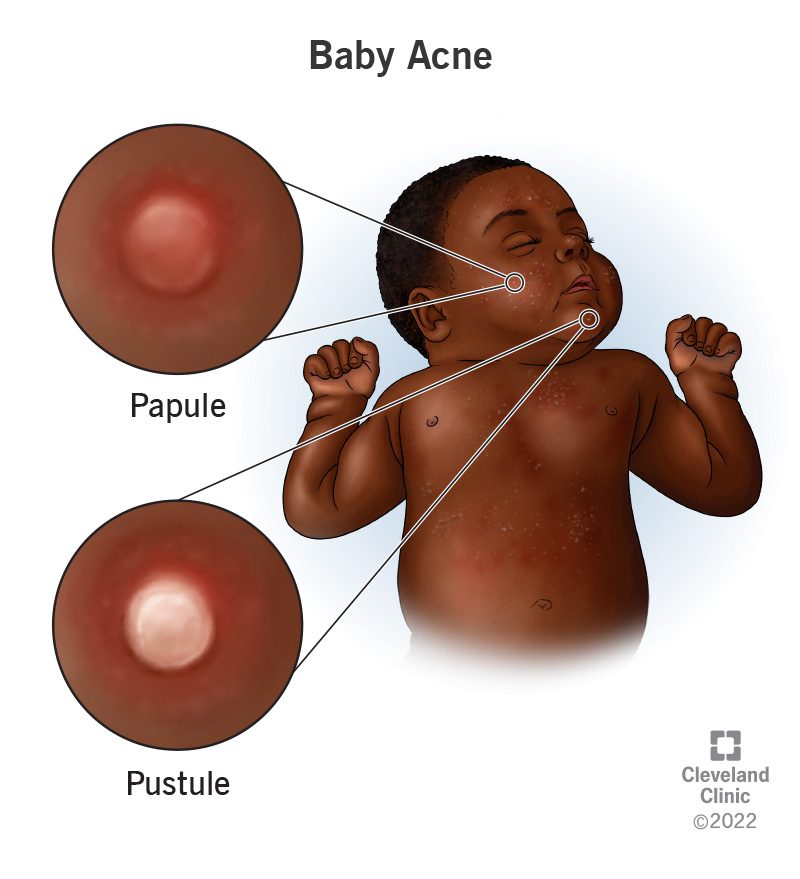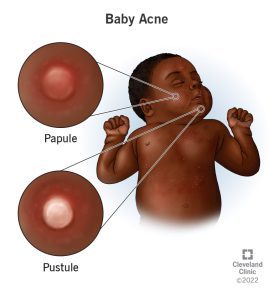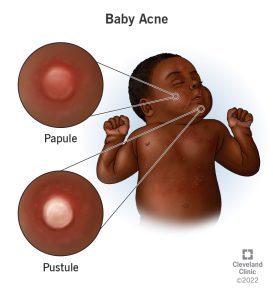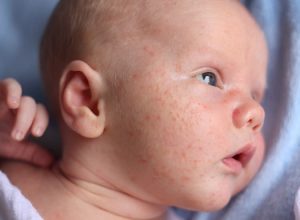To help baby acne, gently cleanse the affected area with mild soap and water and avoid using any lotions or creams on the baby’s face. Baby acne is a common skin condition that affects infants, typically appearing as small red or white bumps on their face.
While it can be distressing for parents, baby acne usually goes away on its own within a few weeks or months. However, if you’re looking to help alleviate the discomfort and speed up the healing process, there are some simple steps you can take.
We will explore various methods to treat baby acne naturally and effectively. Remember, always consult with your pediatrician before starting any treatments or applying any products to your baby’s delicate skin.
Understanding Baby Acne
Baby acne is a common condition that affects newborns and infants. While it may be distressing for parents, it usually resolves on its own without treatment. However, you can help alleviate baby acne by keeping their skin clean and avoiding harsh products.
Baby acne, though harmless, can cause concern for parents. It is a common skin condition that affects newborns and infants. While it usually clears up on its own, understanding the causes and common areas affected can help parents provide the necessary care to alleviate their baby’s discomfort.
Causes Of Acne
Baby acne is believed to be caused by the hormones passed from the mother to the baby during pregnancy. These hormones can stimulate the baby’s oil glands, leading to the development of acne. In some cases, certain medications taken by the mother during pregnancy can also contribute to baby acne.
It is important to note that baby acne is not caused by poor hygiene or an allergic reaction to products. Avoid the temptation to scrub or use harsh cleansers on your baby’s face as it can further irritate the skin.
Common Areas Affected
Baby acne typically appears on the face, especially on the cheeks, chin, and forehead. These areas contain a higher concentration of oil glands, which makes them more prone to developing acne.
It is essential to distinguish baby acne from other skin conditions such as eczema or milia. Eczema usually appears as red, scaly patches on the skin, while milia presents as small, white bumps.
Now that we have covered the causes and common areas affected by baby acne, let’s move on to helpful remedies and treatments that can help soothe your baby’s skin.

Identifying Baby Acne
Baby acne is a common skin condition that affects many infants, typically appearing within the first few weeks after birth. It is essential for parents to be able to distinguish baby acne from other skin conditions and know when to seek medical advice.
Distinguishing Baby Acne From Other Skin Conditions
Identifying baby acne can be challenging, as it can resemble other skin conditions. However, there are key characteristics that can help distinguish baby acne from other rashes. Baby acne often presents as small, red bumps or pustules on the baby’s face, particularly on the cheeks, nose, and forehead. These blemishes are not accompanied by itching or discomfort and may come and go over time.
When To Consult A Pediatrician
If you notice that your baby’s skin condition is not improving or if you have concerns about the appearance of the rash, it is advisable to consult a pediatrician. Additionally, if the rash is accompanied by other symptoms such as fever or irritability, seeking medical advice is important to rule out any underlying issues.
Natural Remedies For Baby Acne
Discover natural remedies for baby acne to help soothe your little one’s skin. From gentle baby skincare products to simple home remedies like coconut oil, there are effective ways to manage and treat baby acne without harsh chemicals or medications.
Providing relief for your precious baby’s delicate skin.
Natural Remedies for Baby Acne Babies have delicate skin that can be vulnerable to acne. Natural remedies offer gentle and effective ways to manage and alleviate baby acne without harsh chemicals. Here are some natural remedies that can help soothe and treat baby acne.
Importance Of Gentle Skincare
It is crucial to use gentle skincare products for babies with acne, avoiding harsh chemicals that can irritate their sensitive skin. opt for mild, fragrance-free cleansers and moisturizers specifically designed for babies.
Olive Oil As A Moisturizer
Olive oil can act as a natural moisturizer for baby acne. Gently massage a small amount of extra virgin olive oil onto the affected areas to help hydrate the skin and reduce inflammation.
Benefits Of Breast Milk
Breast milk contains natural antibodies that can help combat the bacteria and inflammation associated with baby acne. Apply a few drops of breast milk directly onto the affected areas for its antimicrobial and soothing properties.
Aloe Vera’s Soothing Effects
Aloe vera is renowned for its soothing and healing properties, making it an excellent natural remedy for baby acne. Apply a small amount of pure aloe vera gel onto the affected areas to help reduce redness and inflammation. By incorporating these gentle and natural remedies into your baby’s skincare routine, you can help alleviate baby acne and promote healthy, clear skin without exposing your little one to harsh chemicals.
Home Remedies To Try
Baby acne is a common condition that typically appears within the first few weeks of a newborn’s life, causing small red or white bumps on the skin. While it usually resolves on its own, there are home remedies that can help alleviate symptoms and soothe your baby’s skin. Here are some effective home remedies to try:
Warm Water Compress
Applying a warm water compress can help open the pores and reduce inflammation. To do this, soak a clean, soft cloth in warm water and gently press it against the affected areas of your baby’s skin for a few minutes. Be sure to use lukewarm water to avoid discomfort.
Avoiding Harsh Chemicals
Avoid using harsh or scented products on your baby’s delicate skin. Opt for gentle, fragrance-free baby soaps and detergents to minimize irritation. Be mindful of the ingredients in any skincare products you use on your baby, and select products with natural and soothing ingredients that are suitable for sensitive skin.
Changing Baby’s Bedding Regularly
Regularly changing your baby’s bedding can help prevent the buildup of oils, dirt, and bacteria that could contribute to baby acne. Choose soft, breathable fabrics for their bedding, and change it at least once a week to maintain a clean and comfortable sleeping environment.
Dietary Considerations
To address baby acne, considering dietary adjustments can be beneficial. Avoiding common allergens like dairy and soy may help reduce inflammation and improve skin health. Introducing probiotic-rich foods and maintaining a balanced diet can also support overall skin wellness for infants.
Effects Of Maternal Diet On Baby’s Skin, Incorporating Probiotics
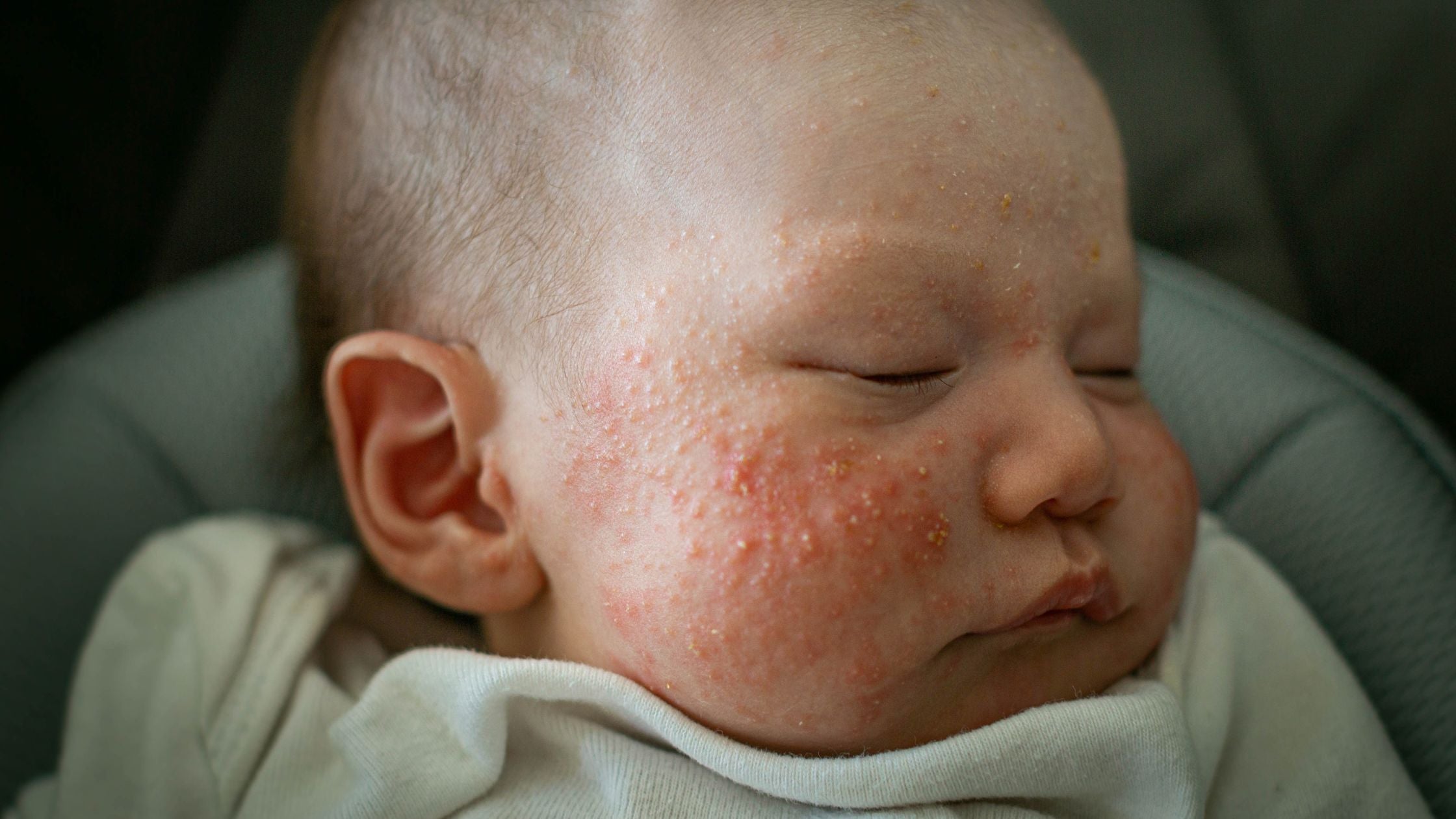
When To Seek Medical Advice, Persistent Acne Symptoms
Schedule a visit if rash persists longer than 3 months without improvement.
Signs Of Infection
Look for redness, warmth, or painful pustules indicating infection.
Baby acne is common, but if symptoms don’t improve or there are signs of infection, seeking medical advice is crucial.
Preventive Measures
Keeping Baby’s Skin Clean
Baby acne can be exacerbated by dirt, oils, and bacteria on the skin. Keeping your baby’s skin clean is essential in preventing acne breakouts. Here are a few tips to ensure optimal cleanliness:
- Use a mild, fragrance-free baby cleanser to wash your baby’s face once a day.
- Gently pat dry the skin with a soft towel or cloth; avoid rubbing as it may irritate the skin.
- Avoid using harsh soaps or excessive scrubbing, as this can worsen baby acne.
- Keep baby’s hands clean to prevent them from touching their face and introducing bacteria.
Choosing Baby-friendly Products
When it comes to baby acne, it’s important to choose products specifically designed for sensitive baby skin. Here are some factors to consider when selecting baby-friendly products:
- Opt for non-comedogenic products that won’t clog your baby’s pores.
- Look for hypoallergenic products that are less likely to cause allergic reactions.
- Avoid products with harsh chemicals, fragrances, or dyes that could irritate the skin.
- Stick to gentle, fragrance-free moisturizers formulated for babies.
- Read product labels carefully and consult with your pediatrician if unsure about any ingredients.
Can Breast Milk Help With Baby Acne?
Yes, breast milk can help with baby acne due to its antibacterial properties. Simply apply a small amount to affected areas.
What Triggers Baby Acne?
Baby acne can be triggered by maternal hormones, skin irritation, or baby’s reaction to new skincare products.
When Does Baby Acne Peak?
Baby acne typically peaks around 2 to 3 weeks of age, gradually improving by the time the baby is 6 months old. Good skin care and avoiding harsh products can help manage the condition.
Is Baby Acne Painful For The Baby?
Baby acne is generally not painful for the baby. It is a common skin condition that typically goes away on its own.
Conclusion
There are simple yet effective ways to alleviate baby acne. By following a gentle skincare routine, keeping the baby’s face clean, avoiding harsh chemicals, and providing proper ventilation, you can help soothe your little one’s skin. Remember to consult a pediatrician if the condition persists or worsens.
With patience and care, you’ll be able to minimize baby acne and ensure your baby’s skin stays healthy and happy.

